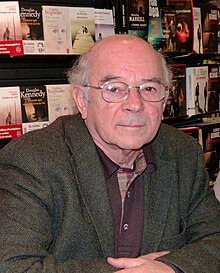You can help expand this article with text translated from the corresponding article in French. (February 2015) Click for important translation instructions.
|
| Robert Bober | |
|---|---|
 Robert Bober in 2010 Robert Bober in 2010 | |
| Born | (1931-11-17) 17 November 1931 (age 93) Berlin, Weimar, Germany |
| Nationality | French |
| Occupation(s) | Film and theatre director, writer |
| Awards | Chevalier des Arts et des Lettres, Prix du Livre Inter |
Robert Bober (born 17 November 1931) is a French film director, theater director and writer of German-Jewish origin. He was born on November 17, 1931, in Berlin. Working as a film-maker for television since 1967, he has made close to 120 documentary films. His first novel, Quoi de neuf sur la guerre? (What's new about war?) received the Prix du Livre Inter in 1994.
Early life
Robert Bober was born in Berlin in 1931 to Jewish parents of Polish origin. In 1933 the family flees Nazism and takes refuge in France. Thanks to an early warning, the family managed to avoid the Velodrome d'Hiver roundup of July 1942, where many Jews were killed or deported. At 16, he began an apprenticeship as a tailor and made a living that way until the age of 22 when he turned to pottery. During his summer vacations he spent time with children who had lost their families during the Second World War.
Career
In the 1950s, Bober met François Truffaut and became his assistant for the films 400 Blows (1959), Shoot the Piano Player (1960), and Jules and Jim (1962). In 1967 he directed his first documentary for TV. During the 1960s and 1970s his documentaries primarily explored the consequences of the Holocaust.
In 1979 he collaborated with Georges Perec on a documentary film called Ellis Island Revisited, also published in book form.
Bober has published 4 novels with the French publisher P.O.L.: Quoi de neuf sur la guerre (1993), Berg et Beck (1999), Laissées-pour-compte (2005) and On ne peut plus dormir tranquille quand on a une fois ouvert les yeux (translated as Wide Awake) (2010). Of these novels, only Wide Awake has been translated into English. It was published by The New Press.